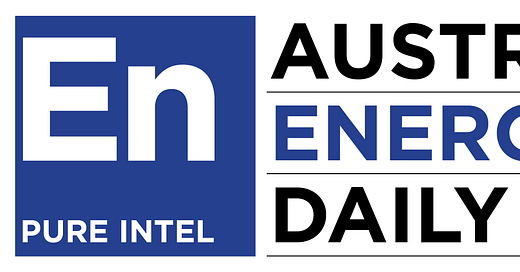Day 64: 'We've got it right'
An introductory weekday newsletter from Schwartz Media. Counting the days since Australia had an energy policy.

Good morning and welcome to day 64.
Today in summary: the government is standing firm on climate policy in the face of the Wentworth byelection loss; the ACCC’s Rod Sims changes his tune on gas reservation; and South Australia gets A$100 million of federal funding for its Home Battery Scheme.
— Charis
Today’s policy spin level: 💨💨💨💨💨
Prime Minister Scott Morrison and Treasurer Josh Frydenberg have recommitted to the government’s current climate policy, following the record swing against the government in Saturday’s Wentworth byelection. Morrison told reporters “On climate policy, we have got that right,” and Frydenberg said the government did not intend to “reduce emissions at the expense of people’s power bills”. A Wentworth exit poll of 1,049 voters by progressive think tank the Australia Institute saw 78% nominate climate change as having some influence on their vote, and 33% nominate it as the most important issue.
Meanwhile, the return to a hung parliament is not expected to bode well for CKI’s bid for APA Group, awaiting a Foreign Investment Review Board decision from Treasurer Josh Frydenberg. Crossbencher Bob Katter has issued a statement with a list of demands that will help ensure his “enthusiastic support” for the government to run full-term.
“There must be no further sell off of this nation… Foreigners own 83% of our mineral wealth, nearly 100% of our gas.”
Australian manufacturers calling for increased government intervention on gas have gained a new ally in competition regulator Rod Sims. The ACCC chair has reportedly had a change of tune on gas reservation, telling the ABC he did not foresee the current supply issues.
"I think what we hadn't seen, what I hadn't seen, is the fact that we've got three large LNG producers when we really only had gas for two-and-a-half.
“We've also got the moratorium or bans on gas in fact in Victoria and in virtual ban in New South Wales.”
Federal funds continue to flow into state-based energy projects. The Australian Renewable Energy Agency will provide A$7.5 million of federal funding to Singapore Power-owned Jemena to trial a renewable hydrogen-powered electricity generation facility in Western Sydney. And A$100 million of matched funding will go to South Australia via the Clean Energy Finance Corporation to help 40,000 South Australian households access state government grants and loans to pay for installation of home battery systems.
Coming up
The COAG Energy Council meeting is scheduled for this Friday, where we can expect more fireworks over state versus federal energy policy. At a conference earlier this month Victorian Energy Minister Lily D’Ambrosio told the audience she’d only found out about the meeting by reading it in the paper.
The House of Representatives will today debate the “Timely Publication of Emissions” Bill, being presented by Centre Alliance MP Rebekha Sharkie. The Bill requires the government release data on Australia’s carbon pollution levels within five months of the end of each quarter (or explain why it can’t),
The Commentariat
Integrated assessment models, used by policymakers to identify the rate at which society can apply a price on carbon emissions, tell us “very little” about the social cost of carbon, writes Climate KIC Australia’s Kate Mackenzie.
“A key component of that social cost of carbon is the discount rate – basically choosing how much or how little we care about our children’s futures, and putting it into a model with the guise of objectiveness and precision. This idea – that our wealth today is more important than risks to others tomorrow – equates to a low SCC that justifies limited action to cut emissions.”
Three more things
The Victorian government has launched an energy brokerage pilot, which will be delivered in partnership with the Brotherhood of St Laurence. The pilot is expected to connect 10,000 low-income households with energy brokers to help them find and switch to better energy offers.
India wants to use its beaches for nuclear fuel, tapping into their rich deposits of thorium - an alternative nuclear energy source often viewed as being a cleaner, safer alternative to conventional nuclear fuels. Thorium has been subject to renewed industry focus in recent years, although the nation’s nuclear establishment concedes that thorium will remain an unlikely source of energy generation until the 2050s.
The Federal Government on Friday accepted all of the Climate Change Authority's recommendations in its review of the National Wind Farm Commissioner. The Authority’s report, released in May, found the Commissioner had a positive impact when dealing with community concerns about wind farms, and recommended the role be extended to cover large-scale solar and battery storage developments.
This is an introductory service while we’re building a comprehensive daily paid online publication, coming in early 2019.
We’re not here to take sides, simply to cut through the noise, and help you make sense of the emerging policy and market trends you need to be across. We call it pure intel. You can read more about us here.


